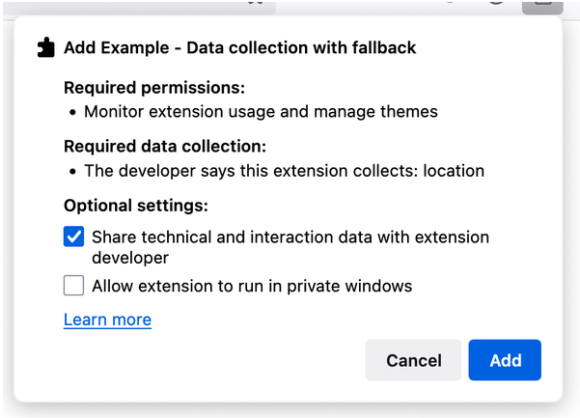Browser extensions extend the functionality of a web browser or the displayed websites and apps. They can be very useful, for instance to block advertisement, prevent tracking, enable bulk downloading, change something on a website, or help improve your browsing in other ways.
However, the popularity has also led to the rise of extensions that do not have the best of users at heart or at all. From malicious extensions to browser add-ons that collect and sell user data.
Mozilla announced an upcoming change to the Firefox extension ecosystem that has far-reaching consequences. Extensions "will be required to specify if they collect or transmit personal data" starting November 3, 2025, writes Mozilla in a new blog post on the official add-ons blog.
The important details:
- The change applies to new extensions only at first, not new versions of existing extensions.
- All extensions will have to disclose the information in the first half of 2026.
- Extensions that do not collect or transmit anything still have to specify this.
- The information is displayed to users during installation of an extension.
When an extension collects data, Firefox displays the data that it collects as part of the installation prompt. Mozilla shared an image of an extension that collected the location information according to the data the developer provided.

Extensions that do not collect any data still have a "data collection" section listed. Mozilla reveals here that the developer stated that the extension does not collect any data.
Mandatory for all extensions from 2026 onward
Initially, only new extensions are required to provide data collecting information. Existing extensions may add the information voluntary, but need to continue doing so once started.
Mozilla revealed that all Firefox extensions will be required to provide the information from 2026 onward. The organization has not set a specific date at the time, but mentioned that it would likely become mandatory in the first half of 2026.
Extensions that do not have the information in their manifests but are required to will be prevented from being submitted to the Firefox extensions repository. Mozilla says that developers will receive an error message during signing if that is the case, so that they know why an extension was not signed.
Closing Words
Clearly, Mozilla wants to improve transparency when it comes to the collection of user data by extensions. That is a good decision, even though the information the developer provides does not appear to be verified automatically. This is not different from how other extension stores or application stores handle the information though.
The change could be disruptive. Mozilla has not revealed how it plans to deal with extensions that are no longer updated. Will they stop working altogether because of the missing information by 2026?
Now You: what is your take on the change? Good move by Mozilla to improve transparency, or do you fear, that some Firefox extensions will no longer function in the browser once the new policy gets mandatory for existing extensions? Feel free to leave a comment down below.
Thank you for being a Ghacks reader. The post Firefox Extensions need to disclose data collecting starting November 3, 2025 appeared first on gHacks Technology News.


0 Commentaires